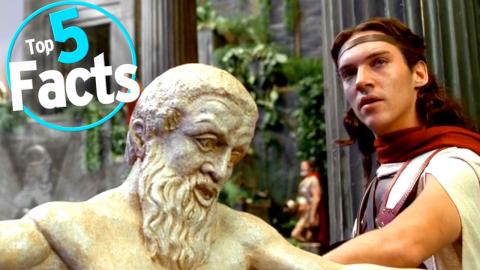Top 5 Facts About Ancient Greece

The Ancient Greeks were known for their revolutionary politics and groundbreaking ways of thinking, and are called the fathers of Western civilization. But how much about them do you actually know? Welcome to WatchMojo's Top 5 Facts. In this installment, we're counting down the five most fascinating things that you probably didn't know about the Ancient Greeks.
Special thanks to our user christo for submitting the idea using our interactive suggestion tool at http://www.WatchMojo.comsuggest
- Ancient Greece Wasn't a Country, But a Group of Smaller, Individual City-States
- Western Literature Began in Ancient Greece (as Did Pretty Much Everything Western, Really)
- Ancient Greeks Were Weirdly Obsessed with a Good Beard
- Ancient Greece Produced Some All-Time Geniuses
- Ancient Greek Democracy Was Very Different from Our Own
#5: Ancient Greece Wasn’t a Country, But a Group of Smaller, Individual City-States
A common misconception is that Ancient Greece was one, unified country. Sorry to burst your bubble, but nope: Ancient Greece was actually comprised of many city-states, called “poleis.” You’ve heard of places like Athens, Sparta, Corinth and Thebes? These were all Ancient Greek city-states. These poleis were typically small in terms of population and size, and essentially like individual countries that only housed one city each. Because of this, each polis had its own judicial, political, legal and currency systems, which – like we said – basically made them independent countries. Despite these differences, though, the poleis shared some common features, like language and broad religious beliefs, which helped establish a connection and political alliances between states. Even so, back in the day, Greece as we know it today did not exist.
#4: Western Literature Began in Ancient Greece (as Did Pretty Much Everything Western, Really)
Do you enjoy reading books, watching movies or even reciting the alphabet? Thank the Ancient Greeks. They placed considerable emphasis on both the written word and drama. In fact, according to historians, the Western literary tradition began with Homer when the poet (or collection of poets, as some believe!) created the timeless works “The Iliad” and “The Odyssey.” As evidenced by the myriad Greek amphitheaters that still stand, we can also surmise that the Greeks loved them some drama. Makes sense; they basically invented the format and produced enduring works of art in both comedy and tragedy. Oh, and the English language itself? Yup, that pretty much started with the Ancient Greeks too. They introduced vowels to written language, giving rise to the Latin alphabet and the languages that subsequently stemmed from it.
#3: Ancient Greeks Were Weirdly Obsessed with a Good Beard
Ever noticed that, like, every bust or statue of an Ancient Greek man is rocking a long, curly beard? Ever wonder why? Well, it’s not because they didn’t have razors; the Ancient Greeks saw the beard as a representation of masculinity. Conversely, they saw a smooth, cleanly shaved face as feminine. What’s more, a healthy beard was also a sign of intelligence, and philosophers like Socrates and Plato believed that a long beard was actually discharge from an overcrowded brain. It wasn’t until Alexander the Great came along that shaving was encouraged – but even then, it wasn’t an aesthetic thing; it was because many Macedonian soldiers had been killed in battle after being grabbed by their beards.
#2: Ancient Greece Produced Some All-Time Geniuses
We’re assuming that not every citizen of Ancient Greece turned out to be a beacon of revolutionary ideas. Truth is, though, the civilization produced many geniuses that helped give rise to modern knowledge. In school – for those of the male persuasion whose families could afford it, anyway – boys were taught the fundamentals of reading and writing, but also studied musical instruments and advanced topics like geometry and astronomy. Aside from philosophers like Plato and Socrates, these schools also produced some other fantastic minds, such as the astronomer, mathematician and geographer Eratosthenes, who miraculously gave a nearly accurate figure of the Earth’s circumference by comparing the length of shadows at different latitudes. So, point being: Ancient Greece had its fair share of smarty-pants.
#1: Ancient Greek Democracy Was Very Different from Our Own
Ancient Greeks were the architects of democracy and Athens was its birthplace. However, their political system was far different from our own, and was kind of lame in some ways. Most modern societies practice a representative democracy, where citizens elect officials to make most of the decisions. The Greeks practiced direct democracy, where they cut out the middleman and vote on issues themselves. Sounds great, right? Well, there are reasons it’s rarely been used since Ancient Greece. To start, it takes a lot of time to attend debates and votes, so eligible citizens needed free time to focus on politics. Athenian citizens had free time because slavery. They had lots of slaves. Also, we said “eligible” citizens. That meant males over the age of 18 with an Athenian heritage. The vast majority of people in Athens had no say in how the place was run. So, while Athens is credited as the birthplace of democracy and some of its elements are similar to today’s political systems, modern democracy is a very different institution. For better or worse.
So, what fact surprised you the most? Would you want to hop in a time machine and check out the culture for yourself? For more philosophizing top 10s and luscious, curly top 5s, be sure to subscribe to WatchMojo.com.
